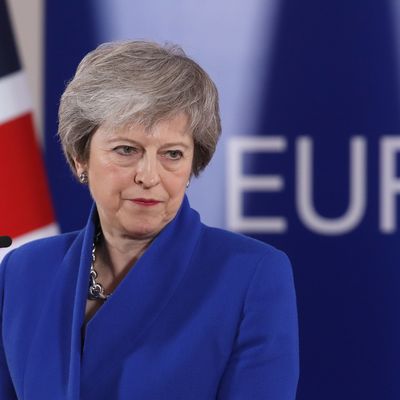
Leaders of the European Union approved a Brexit deal with the U.K. on Sunday, clearing — at least on Europe’s end — the path for the U.K. to formally exit the bloc in the end of March. Getting the E.U.’s approval for a deal was a major hurdle for the U.K., where voters narrowly voted to leave the E.U. in a 2016 referendum, but it is by no means the final or biggest one. The deal, which was the result of a year and a half of often contentious negotiations, still needs to be approved by the British Parliament, where a politically diverse majority of lawmakers are already lined up against the deal for being too much, too little, or totally stupid and unnecessary.
As for what the deal entails, it does allow for an orderly Brexit, but in doing so just preserves the status quo for almost two more years. Britain would be out, but would continue to follow E.U. laws and regulations for a post-Brexit transition period, and there are some legal backstops should the E.U. and Britain be unable to come to terms on new agreements — like on the thorny issues of trade, the Northern Ireland border, work and travel visas, and the rights of fisherman — before the transition period is over at the end of 2020.
The deal makes no real guarantees about what the future E.U.-U.K. agreements would ultimately be, as it only contains political declarations from both sides assuring each other that they want to figure it all out and make each other happy — eventually. Should that good faith not translate to signed agreements, the legal backstops in the current deal would limit the messiness of the divorce, but definitely not favor the U.K. in that it will have to stick to laws and regulations it has no power to change from outside the E.U.
The U.K. will also owe the E.U. $50 billion and have to give up Gibraltar, so long as its residents agree to that, and almost all of them voted “Remain” in 2016. (For a full rundown of the various grey areas and outstanding controversies of the deal, read this BBC explainer.)
Embattled U.K. prime minister Theresa May, who negotiated the deal amid backstabbing and resignations within her own leadership team, vowed on Sunday to campaign for the agreement back home ahead of the Parliament vote on December 12. She also insisted there would be no other or better option for the U.K. — a sentiment echoed by European Commission President Jean-Claude Juncker. “This is the deal on the table,” May said after the vote. “It is best possible deal. It is the only deal.”
“In Parliament and beyond it I’ll make the case for it with all my heart and I look forward to that campaign,” she declared, but also twice refused to say whether she would resign as prime minister if she is not successful in the effort.
If May can will Brexit’s way through Parliament, Sunday’s vote theoretically eliminates the full blown disaster of a no-deal Brexit — a result which would have caused, at best, a chaotic political crisis for all involved, but particularly for the U.K.. If she and the remaining Brexit backers fail to get the deal through Parliament, and a new agreement is not reached with the E.U., there will be either a messy automatic no-deal Brexit, a new U.K. general election, or another nationwide referendum — all of which would have enormous political and economic consequences. And regardless of whether May acknowledges it or not, she would almost certainly be finished as prime minister if she loses this fight.
That seems likely, at least as of Sunday, since the E.U.-approved agreement is opposed by the Labour, Liberal Democrats, SNP, and DUP parties, as well as more than 80 MPs in May’s Conservative (Tory) party (and she can’t lose more than six). For just a glance at how and why those Tories are opposed and how difficult it will be to win them over, more than a dozen have said they want a new Brexit referendum altogether, while more than 50 are hardliners who are holding out for a more brutal breakup.
Outside of the Kremlin, few could be happy with Sunday’s outcome on either side of the channel. The E.U. didn’t give much of anything, but no European leaders seemed to want to go through with Brexit on Sunday, as most have agreed with economists and political scientists that it will leave everyone involved worse off than when they started. The already disruptive rancor in Britain, meanwhile, will only intensify in the coming weeks. Yet the Brexit train plows on.
After the vote, German chancellor Angela Merkel said it was a “historic day,” but one that left her both sad and relieved. May claimed she felt no sadness, but she and a lot of people in the U.K. may feel differently a month from now, and with no relief in sight.






























